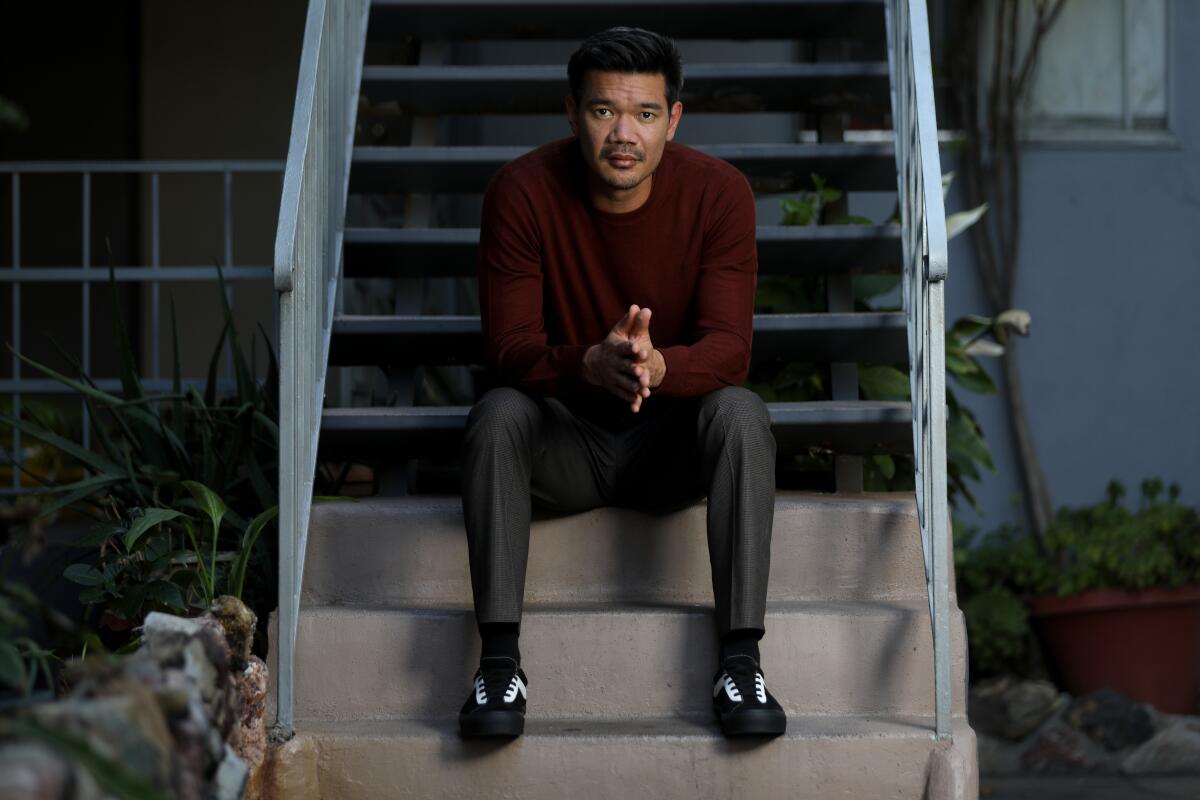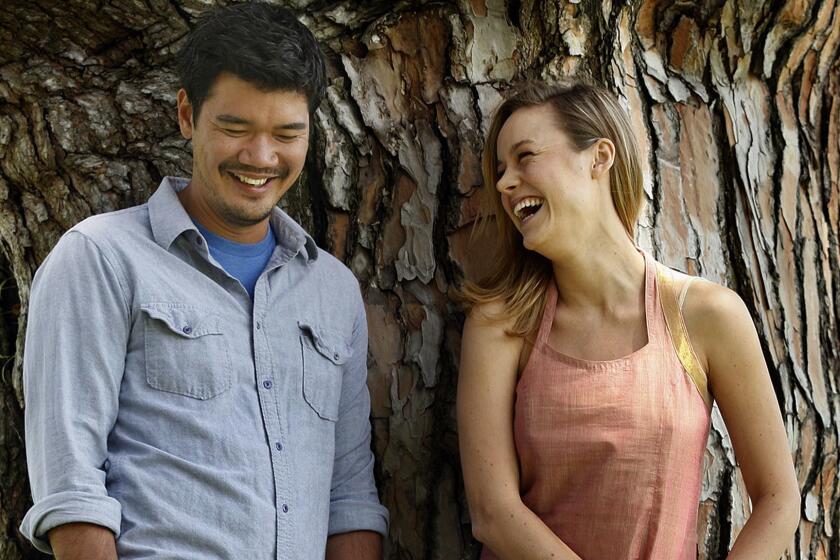How the ‘Just Mercy’ director made a real-life superhero film about a death row inmate

- Share via
When Destin Daniel Cretton begins filming Marvel’s highly anticipated “Shang-Chi and the Legend of the Ten Rings” in the new year, he’ll consider it the second superhero movie he will have made.
The first is “Just Mercy” starring Michael B. Jordan as civil rights defense lawyer Bryan Stevenson, whose career-long crusade to save individuals from the death penalty and effect criminal justice reform is about to get its own origin story onscreen.
After an awards-qualifying run in limited release beginning Christmas Day, the film will open nationwide on Jan. 10. But the attorney and activist at the center of “Just Mercy” entered the Hollywood spotlight in August after a special screening of the film in Los Angeles, when Cretton and actors Michael B. Jordan, Brie Larson and Jamie Foxx — all of whom have Marvel movies on their resumes — assembled for an emotional Q&A. They were joined by Stevenson, who drew the biggest applause.
“It’s fun to say Bryan is a superhero, but the dude is real,” Cretton told The Times a month later at the Toronto International Film Festival. The night before, he’d teared up while introducing Stevenson onstage, when the film officially premiered.
“To be able to see what he sees on a daily basis and go into these places that most of us want to just pretend are not there and to somehow do that and still have the grace and hope and inspiring spirit that he has, is mind-boggling to me,” he said.

Based on the 2014 New York Times bestselling memoir “Just Mercy: A Story of Justice and Redemption,” the film stars Jordan as the Delaware-born Stevenson, an eager young attorney whose compassion is awakened while working with clients on death row in the deep South.
Foxx costars as Walter McMillian, an African American pulpwood worker sent to Alabama’s death row in 1988 for the murder of a white woman, who maintains his innocence as his clock ticks down and his tenuous hopes for exoneration fade.
Directing a script he wrote with Andrew Lanham, Cretton tracks Stevenson’s fight to overturn McMillian’s death sentence and those of other inmates sentenced to die in Alabama, the only U.S. state that does not provide postconviction legal aid to the condemned.
It charts the early work with advocate Eva Ansley (Larson) that led to the 1989 founding of the Equal Justice Initiative, a nonprofit dedicated to battling racial and economic injustice, mass incarceration and excessive punishment.
Depicting quietly heartbreaking moments with characters on both sides of the prison walls, “Just Mercy” illuminates entrenched failings of an American criminal justice system that disproportionately incarcerates minorities and the marginalized. Throughout the film, Stevenson’s mission rings loud. In depicting how he was inspired to action, the filmmakers hope their audience will be too.
By detailing the challenges, frustrations and particulars of the legal process — for which Cretton had Stevenson on speed-dial to answer questions of accuracy — “Just Mercy” shows moviegoers the work involved and how much perseverance it took to land even the smallest wins. “But it was equally important to show how effective they were,” said Cretton, “and how that persistence does pay off.”
By the end of this book, where you’re confronted with so many harsh truths, you expect to be depressed. But I somehow felt really hopeful and inspired.
— Destin Daniel Cretton
Cretton, who grew up in Hawaii and spent his postcollegiate years making short films in San Diego, had won the Sundance jury prize for his 2008 short film “Short Term 12,” which he would later adapt into his 2013 sophomore narrative feature of the same name starring Larson as a group home counselor working with troubled kids.
A few years later, Oscar-nominated producer Gil Netter (“The Blind Side,” “Life of Pi”) optioned “Just Mercy” and approached Cretton to direct. Cretton read the book and found himself crying — and, to his surprise, laughing — in coffee shops as he pored over Stevenson’s elegantly pointed and poignant writing.
“These characters are so human and I just felt like I knew them,” Cretton remembered. “I felt like they were my friends. By the end of this book, where you’re confronted with so many harsh truths, you expect to be depressed. But I somehow felt really hopeful and inspired.”
Stevenson’s book and his ongoing work “capture everything that I strive to be,” he added. “I strive to have a life that is not afraid to look at the hard truths in life. I don’t want to be naive to the problems in the world around me. But I also really don’t want to be cynical about this life. I see it as a gift.”
Now based in Los Angeles and father to a toddler, Cretton admits he didn’t always feel that way. “I was super cynical in my 20s. But cynicism, it makes you lazy, and it makes you not want to do anything. To me it’s really hard to be both informed and yet hopeful ... and that, to me, is the power of Bryan Stevenson and his work.”
A constellation of close creative connections brought the project to fruition as Warner Bros. came onboard. As both star and producer alongside Netter and Asher Goldstein (“Short Term 12”) for his own Outlier Society banner, Jordan helped recruit Foxx to play the pivotal role of McMillian.
Michael B. Jordan produced and stars in the biopic “Just Mercy,” which had its world premiere at the Toronto Film Festival to great acclaim.
Fittingly, another superhero connection led to Jordan’s early involvement in “Just Mercy” — a surprise assist from “Black Panther” director Ryan Coogler. During a phone chat with Coogler, Cretton says, he mentioned his interest in casting Jordan as the lead of “Just Mercy.”
“Ryan was like, ‘Oh, yeah? OK, hold on,’” said Cretton. “He put me on hold and when he popped back in it was him and Michael B. Jordan — he’d conferenced him in. I’m pretty sure he was up in Vegas because there was, like, bass thumping in the background. Right then, I had to pitch Michael B. Jordan the project.”
As an actor, “I grew up a lot on this movie,” said Jordan, whose credits date to the first season of HBO’s “The Wire” in 2002 and also include the Coogler-directed “Black Panther,” “Fruitvale Station” and “Creed.” “I took chances and risks that I normally didn’t have the opportunity to, or maybe wouldn’t have done at an earlier age. It challenged me to find another layer, another depth that I haven’t tapped into.”
Early reactions to the film’s deeply felt performances, including turns by Rob Morgan and O’Shea Jackson Jr. as McMillian’s fellow incarcerees Herbert Richardson and Anthony Ray Hinton, have been “energizing,” Stevenson said. “There’s so much apprehension when you try and get people closer to something that they don’t usually choose to get close to. You worry that they’ll cover their ears and shut their eyes and just kind of reject it.
“To see people slowly open their hearts and take it in, even though it’s challenging at times, is incredibly gratifying and exciting, because if we can get people around the world to open their hearts to the pain of injustice and the trauma that inequality can create, we can motivate people to do more,” he said.
After filming “Just Mercy” last summer in and around Atlanta, Cretton was still in postproduction when he had his first meetings with Marvel this year for “Shang-Chi,” which he’s now prepping as “Just Mercy” is poised to hit theaters.
As “Captain Marvel” continues to rule the box office, its studio is making moves that offer glimpses into what appears to be the much more inclusive future of the Marvel Cinematic Universe.
The experience of telling Stevenson’s story “will inevitably go into anything that I make,” said Cretton, and that includes the cinematic introduction of Shang-Chi, the MCU’s first Asian superhero.
“Life is very short,” he said. “I feel very privileged to be able to be doing work that I really love and privileged to be telling stories that I really connect with. Every story that I’ve participated in has made me a better person and taught me things that I never fully delved into before, and this Marvel movie is no different.
“I hope some Asian kids, no matter how old they are — whether they’re 8 or 35 — feel a little less alone in the world, a little more empowered, just to see faces that look like them onscreen and operating in the Marvel Universe,” he said. “I just hope that I’m creating an experience that has the potential to help somebody feel a little less alone in the world, or a little more empowered to be not only OK but really OK with who they are.”
As for “Just Mercy” which Warner Bros. will open in limited release Dec. 25 before going wide in January, the director hopes to expand the reach of Stevenson’s life mission by bringing audiences closer to those whom the criminal justice system continues to fail.
“We hope that this movie is the start of something,” said Cretton. “We hope that there is enough packed into it that allows you to see something different and go out and start talking about it with your friends, or decide to maybe vote different in the upcoming election, or to maybe start visiting somebody in prison, or to start writing to somebody in prison.… We hope that it inspires people to see this subject from a very human level and hopefully change for the better.”
More to Read
Only good movies
Get the Indie Focus newsletter, Mark Olsen's weekly guide to the world of cinema.
You may occasionally receive promotional content from the Los Angeles Times.













